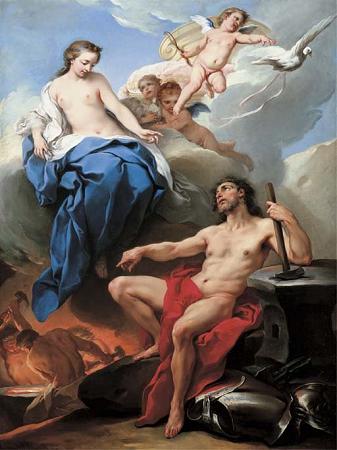
Vulcan / Hephaestus. Vulcan is the god of fire including the fire of volcanoes, deserts, metalworking, and the forge in ancient Roman religion and myth.
He is often depicted with a blacksmith's hammer. The Vulcanalia was the annual festival held August 23 in his honor.
His Greek counterpart is Hephaestus, the god of fire and smithery. In Etruscan religion, he is identified with Sethlans.
Vulcan belongs to the most ancient stage of Roman religion: Varro, the ancient Roman scholar and writer, citing the Annales Maximi, records that king Titus Tatius dedicated altars to a series of deities including Vulcan. The origin of the name is unclear.
Roman tradition maintained that it was related to Latin words connected to lightning, which in turn was thought of as related to flames. This interpretation is supported by Walter William Skeat in his etymological dictionary as meaning lustre. It has been supposed that his name was not Latin but related to that of the Cretan god Velchanos, a god of nature and the nether world. Wolfgang Meid has dispued this identification as phantastic. More recently this etymology has been taken up by Gerard Capdeville who finds a continuity between Cretan Minoan god Velchanos and Etruscan Velchans. The Minoan god's identity would be that of a young deity, master of fire and companion of the Great Goddess. Christian Guyonvarc'h has proposed the identification with the Irish name
He is often depicted with a blacksmith's hammer. The Vulcanalia was the annual festival held August 23 in his honor.
His Greek counterpart is Hephaestus, the god of fire and smithery. In Etruscan religion, he is identified with Sethlans.
Vulcan belongs to the most ancient stage of Roman religion: Varro, the ancient Roman scholar and writer, citing the Annales Maximi, records that king Titus Tatius dedicated altars to a series of deities including Vulcan. The origin of the name is unclear.
Roman tradition maintained that it was related to Latin words connected to lightning, which in turn was thought of as related to flames. This interpretation is supported by Walter William Skeat in his etymological dictionary as meaning lustre. It has been supposed that his name was not Latin but related to that of the Cretan god Velchanos, a god of nature and the nether world. Wolfgang Meid has dispued this identification as phantastic. More recently this etymology has been taken up by Gerard Capdeville who finds a continuity between Cretan Minoan god Velchanos and Etruscan Velchans. The Minoan god's identity would be that of a young deity, master of fire and companion of the Great Goddess. Christian Guyonvarc'h has proposed the identification with the Irish name
Wikipedia ...